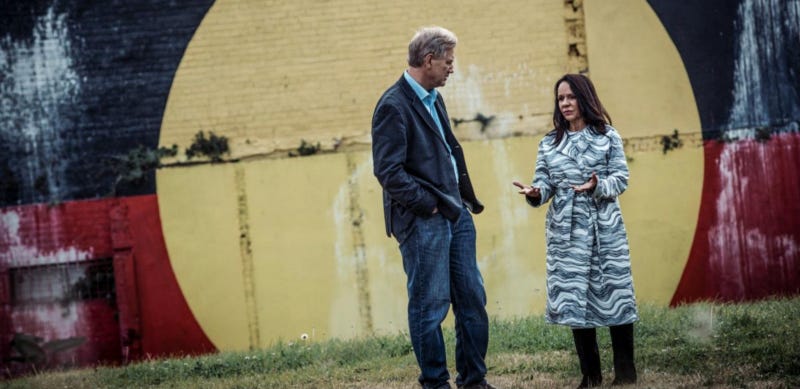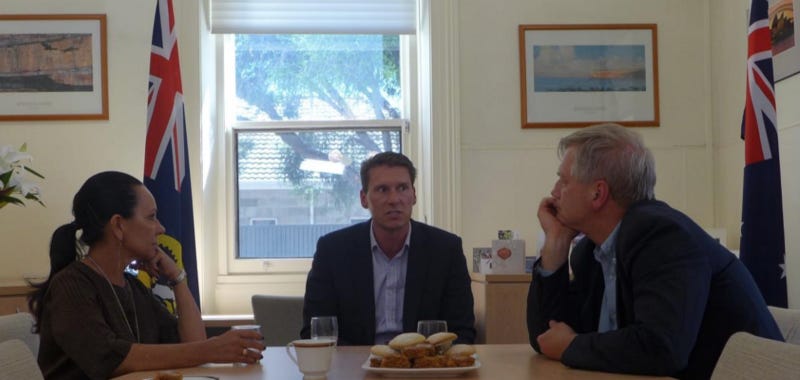ABC’s ill-conceived, offensive Bolt vs Burney doco erases black dissent
There is a point in the ABC’s new documentary ‘Recognition: Yes or No?’ where professional bigot Andrew Bolt proudly proclaims ‘I’m…
There is a point in the ABC’s new documentary ‘Recognition: Yes or No?’ where professional bigot Andrew Bolt proudly proclaims ‘I’m Indigenous’.

Andrew Bolt and Linda Burney in Redfern
It’s not a shock, because he’s said it before, along with all the other ridiculous statements in his repertoire. This proclamation is immediately met with laughter from the Cape York Institute’s Shireen Morris, a constitutional lawyer of Indo-Fijian descent.
“I am, because I was born here,” he protests.
Morris then goes on to explain to him that ‘under Australian law’ there is a three –part definition — descent, community acceptance, self-identification.
“So what I just said was the legal and practical understanding of what you’re saying — incorrect, you’re not Indigenous,” Morris says.
Bolt tries again to protest, to which Linda Burney, the other member of this ‘journey’, pleads: ‘let her finish!’.
And then Morris says this:
“The emotional and spiritual sense of what you are saying, is valid,” she says.
“You feel more connection to this land than to the Netherlands. Just as I feel more patriotic and more connection and land to this land than I do to India or Fiji. Our status as Australian citizens who love their country and feel connected to it is no better or worse than an Indigenous person… however, we’re trying to have a discussion about the constitution here and this means this practical matter for the law and every western democracy that has a colonised people, they make accommodation and they recognise those peoples as Indigenous in order to remedy past discrimination and dispossession of those people.”
That tidbit takes place in the context of Bolt’s inability to grasp that if Australia votes to remove the race power in the constitution at a referendum, there must be another section inserted in order to preserve laws like Native Title.
But the idea that Bolt has the same ‘emotional and spiritual’ connection to land as Aboriginal people is completely groundless. While white Australia views the land as an economic resource to be ripped up and discarded in the pursuit of white prosperity, Aboriginal people believe we don’t just need country, but that country also needs us.
This isn’t a concept confined to 200 years ago, in a time before invasion. It is a mantra that is still alive within our communities, and it exists even if white shock jocks are unwilling to acknowledge it. Aboriginal people do have a special place within this country, particularly in relation to land and water rights, because our ancestors have looked after it for tens of thousands of years.
This exchange also illustrates just how white the legal system is, and that maybe, some concepts can never be interpreted properly through European terms of reference.
Nevertheless, this documentary spends the majority of its time giving Bolt a voice to act as if he is somehow a ‘post-racial’ warrior who believes ‘we are all human’, even though the bloody history of this country points to the opposite.
Throughout the course of the documentary, he furthers his racist notion that to recognize Aboriginal people in the constitution would mean to provide ‘special treatment’.
“Recognition: Yes or No?” is produced by non-Indigenous production company Smith and Nasht Pty Ltd, who also brought you ‘Howard on Menzies’. The title itself is deceptively simplistic because we really don’t know what ‘Recognition’ is yet. How can you take a ‘yes’ or ‘no’ side when the question is far from settled?
But regardless, the documentary has done its best to undermine the debate through this gross simplification, using ALP Wiradjuri MP Linda Burney as the ‘yes’ voice, and Bolt, as the ‘no’ voice.
The fact this elementary discussion is even taking place as a way to explain the complex nature of ‘constitutional reform’ in its current form, is just one flaw in this naive, ill-considered and down right offensive documentary. It also comes half a decade into the convoluted Recognise process, when we still don’t know what ‘Recognition’ means, what model it will take, and before Aboriginal people have even had a proper say.
Of course, no room is given to actual Aboriginal opposition to a ‘no’ vote. Instead, the use of several high-profile Aboriginal supporters of constitutional reform contributes to the erasure of this black dissent.
The documentary plays lip-service to the Aboriginal-led anti-Recognise movement, only using a couple of quotes from Michael Anderson and Jenny Munro at a protest. It then directly contrasts their very worthy viewpoints from two strong staunch legends, with the conservative Aboriginal commentator Wesley Aird, who Bolt uses as representative of the Aboriginal ‘no’ case, even though he is as far removed away from a large proportion of Aboriginal opinion.
‘Andrew has chosen to meet one such skeptic,” the narrator says, lumping in Anderson, Munro and Aird into one voice.
The healthy First Nations cynicism to the ‘Reconise’ project has been completely neglected by mainstream media, largely because the government-funded campaign has had large buckets of taxpayer funds to sprinkle on football fields, and branded t-shirts across the country. The media has also been complicit, as seen in this offering from the ABC.

Linda Burney, Cory Bernardi and Andrew Bolt
There are currently Indigenous conventions planned for regional and urban cities across the nation, and despite the long, drawn-out timeline, these are still early days.
Mick Gooda and Stan Grant represent the Aboriginal ‘yes’ case along with Burney — but they have very limited opportunity to talk about the different models, or whether simply a fluffy preamble, the lowest form of ‘recognition’,would be adequate. They are mostly there to give Bolt an education in ‘Racism 101’.
They are also confined to making shallow observations and the documentary gives them no avenue for context. A case in point is this exchange with Gooda:
“If people are looking for recognition to lead to better social outcomes how do you see that happening?” Bolt asks Gooda.
Gooda replies: “… you’re always told you are the worst people in the community …it was bad to be Aboriginal. And that causes a whole raft of other problems. But it’s actually a bit of healing for the country to say we have to rectify this past damage that was done.
Burney: “There are so many Aboriginal people that don’t feel part of this country. They feel ashamed. And a lot of that dysfunction comes from a sense of not being valued. And recognition in the constitution…
Bolt: You think it would change it?
Burney: I do
Gooda: Totally
Burney: If you change the way anyone views themselves and gives them status and respect and recognition, then things do change, I have seen it.”
But there is even cynicism from Aboriginal people over this very idea — that very limited recognition in the constitution would do anything to change the way blackfellas feel and are seen in society — and a lot of mob are opposed to the idea the rest of Australia get to vote on our future, when we are such a minority. It is a reason why a lot of Aboriginal people feel alienated from the process.
The other Aboriginal voices who get a mention in this documentary is Yalmay Yunupingu and Witiyana Marika in Yirrikala, who talk mostly of treaty and bilingual education, and Murrumu who has declared sovereignty over his Yidinji nation in Cairns.
Bolt largely uses Murrumu as a way to explain his unfounded notion that constitutional change would create a separate society. Bolt has no concept of the fact Australia is already divided along racial lines, because he is a beneficiary of the dispossession of First Nations peoples. For him, the disadvantage in Aboriginal Australia is a result of our own failings, rather than the systematic, structural racist violence within Australia’s institutions.
All of this is a bit too hard for Bolt, but rather than use this opportunity to educate himself, he continues blundering on with his blinkers on.
And the very selection of Bolt is offensive. He already has a show on Sky News, a widely-read syndicated column in the Herald Sun, a blog and regular spots on radio to spread his rhetoric. He now has the taxpayer-funded ABC as well, and their role in promoting this farce is disgusting. They should hang their heads.
Bolt is a man who has severely hurt members of the Stolen Generations through his lies, and the children of those very people who happen to be pale, but are still strong in their identity as Aboriginal people. He should have no say in this debate other than his vote if it does go to Referendum. He has limited stake in it. The changes will not affect him and his privileged position in any way, despite his martyrdom. The ABC has given Bolt a voice before Aboriginal and Torres Strait Islander people themselves have even been properly consulted.
Bolt is also met with very limited scrutiny from interviewees, who largely treat him with respect, an act he has never reciprocated back to Aboriginal people.
His writing in Aboriginal affairs has been continually damaging, hurtful and full to the brim with deceit.
He has made a living out of bashing blackfellas, and the ABC has given him yet another megaphone to amplify his rhetoric. I wouldn’t bother with this latest rubbish from the ABC and I would urge those who are interested in the ‘Recognise’ debate to seek out Indigenous media.
For more on this programme, see University of Newcastle academic Amy Maguire’s piece https://theconversation.com/recognition-yes-or-no-the-abc-asks-the-wrong-questions-of-the-wrong-people-65422


